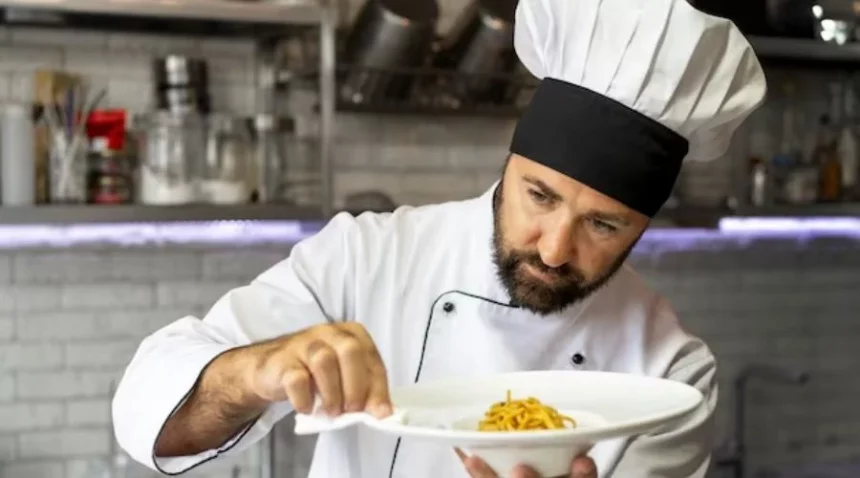Food is an integral part of our daily lives, and chefs have long been revered as the masters of the culinary world. Over the years, the evolution of chef culture has seen a transformation from the classical French style to the more modern fusion approach. The traditional French style, with its emphasis on technique and presentation, dominated the culinary world for centuries. But with the rise of globalization and the fusion of different cuisines, chefs have started to experiment with new flavors and techniques, creating a new wave of cuisine that is both innovative and exciting. In this article, we will take a look at the evolution of chef culture and how it has transformed the culinary world as we know it. We will explore the different styles of cooking that have emerged over the years and how they have influenced the way we eat today. So, let’s dive in and take a culinary journey through time!
The Origins of Classical French Cuisine
The origins of classical French cuisine can be traced back to the 17th century, when the French court of King Louis XIV became the center of culinary excellence in Europe. The French chefs at the time were known for their elaborate preparations of meat and fish, as well as their use of rich sauces and complicated cooking techniques.
One of the most important figures in the development of classical French cuisine was Auguste Escoffier, a renowned chef who worked in the late 19th and early 20th centuries. Escoffier is credited with simplifying the elaborate preparations of French cuisine and creating a more standardized system of cooking. He also popularized the concept of the “brigade de cuisine,” a hierarchical system of kitchen organization that is still used in many restaurants today.
The French style of cooking dominated the culinary world for centuries, with French chefs and restaurants setting the standard for fine dining around the world. However, in the 1960s and 70s, a new style of cooking emerged that challenged the traditional French approach.
The Rise of Nouvelle Cuisine
Nouvelle cuisine was a culinary movement that emerged in France in the 1960s and 70s. The movement was led by a group of young chefs who were looking to break away from the traditional French style of cooking. They sought to create lighter, more delicate dishes that emphasized the natural flavors of the ingredients, rather than hiding them behind heavy sauces and complicated preparations.
One of the most prominent proponents of nouvelle cuisine was chef Paul Bocuse, who ran a restaurant in Lyon, France. Bocuse was known for his innovative cooking techniques and his use of local, seasonal ingredients. He also emphasized the importance of presentation, creating dishes that were as beautiful to look at as they were delicious to eat.
Nouvelle cuisine had a significant impact on the culinary world, inspiring chefs around the world to experiment with new flavors and techniques. However, it was not without its critics, some of whom felt that the movement was too focused on style over substance.
Fusion Cuisine and Its Impact on the Culinary World
The rise of globalization and the fusion of different cuisines led to the emergence of a new style of cooking known as fusion cuisine. Fusion cuisine combines elements of different culinary traditions to create new and exciting dishes that are often a reflection of the chef’s cultural background.
One of the most famous examples of fusion cuisine is the California roll, a sushi roll that was invented in the United States in the 1970s. The California roll combines traditional Japanese ingredients like rice and fish with avocado, a fruit that is native to Mexico.
Fusion cuisine has had a significant impact on the culinary world, inspiring chefs to experiment with new flavors and techniques. It has also helped to create a more diverse and inclusive culinary landscape, reflecting the multicultural societies in which we live.
The Role of Celebrity Chefs in Modern Chef Culture
The rise of celebrity chefs in recent years has had a significant impact on the culinary world. Chefs like Gordon Ramsay, Jamie Oliver, and Emeril Lagasse have become household names, thanks to their television shows, cookbooks, and restaurants.
Celebrity chefs have helped to popularize cooking and inspire a new generation of home cooks. They have also brought attention to important social and environmental issues, such as sustainable agriculture and food waste.
However, the cult of celebrity has also led to some criticism of the industry, with some chefs accused of prioritizing fame and fortune over the quality of their food.
The Impact of Social Media on Chef Culture
Social media has had a significant impact on the culinary world in recent years. Platforms like Instagram and TikTok have allowed chefs to showcase their creations and connect with fans around the world.
Social media has also helped to create a new wave of food trends, with dishes like avocado toast and rainbow bagels becoming viral sensations. While some have criticized these trends as being overly gimmicky, they have also helped to inspire a new generation of home cooks to experiment with new ingredients and techniques.
However, social media has also created new challenges for chefs, who are under increasing pressure to create dishes that are “Instagram-worthy.” This has led to concerns that chefs are prioritizing style over substance, and that the quality of the food is being sacrificed in the pursuit of likes and followers.
The Future of Chef Culture
The future of chef culture is uncertain, but one thing is clear: the culinary world will continue to evolve and change. As technology advances and the world becomes more connected, we can expect to see new flavors and techniques emerging from all corners of the globe.
However, there are also challenges ahead. The restaurant industry has been hit hard by the COVID-19 pandemic, and many chefs and restaurants are struggling to stay afloat. There are also concerns about the environmental impact of the food industry, with issues like food waste and sustainable agriculture becoming increasingly important.
Despite these challenges, the future of chef culture is bright. Chefs will continue to push the boundaries of what is possible, creating new and exciting dishes that reflect the diversity of our world.
Notable Chefs and Their Contributions to the Evolution of Chef Culture
There have been many notable chefs throughout history who have contributed to the evolution of chef culture. Here are just a few:
- Julia Child: Julia Child was a renowned chef and television personality who introduced French cuisine to American audiences in the 1960s. Her cookbook, “Mastering the Art of French Cooking,” is still considered a classic.
- Ferran Adria: Ferran Adria is a Spanish chef who is known for his innovative cooking techniques and his use of molecular gastronomy. His restaurant, El Bulli, was considered one of the best in the world.
- Massimo Bottura: Massimo Bottura is an Italian chef who is known for his modern take on traditional Italian cuisine. His restaurant, Osteria Francescana, has been named the best restaurant in the world multiple times.
- Rene Redzepi: Rene Redzepi is a Danish chef who is known for his use of foraged ingredients and his emphasis on local, seasonal cuisine. His restaurant, Noma, has been named the best restaurant in the world multiple times.
The Changing Landscape of Culinary Education
Culinary education has undergone significant changes in recent years, with new programs and schools emerging to meet the demands of the industry. Many culinary schools now offer courses in sustainability, nutrition, and food science, reflecting the changing priorities of the industry.
There has also been a growing emphasis on diversity and inclusivity in culinary education, with schools and programs working to ensure that students from all backgrounds have access to training and opportunities in the industry.
However, culinary education is still facing challenges, particularly in the wake of the COVID-19 pandemic. Many schools and programs are struggling to adapt to the new reality of online learning, and there are concerns about the future of the industry in the face of economic uncertainty.
Conclusion
The evolution of chef culture has transformed the culinary world as we know it. From the classical French style to the modern fusion approach, chefs have been at the forefront of innovation and creativity. While there are challenges ahead, the future of chef culture is bright, with chefs continuing to push the boundaries of what is possible and create new and exciting dishes that reflect the diversity of our world. As we continue to navigate the changing landscape of the culinary world, one thing is certain: food will always be an integral part of our lives, and chefs will always be the masters of the culinary world.








